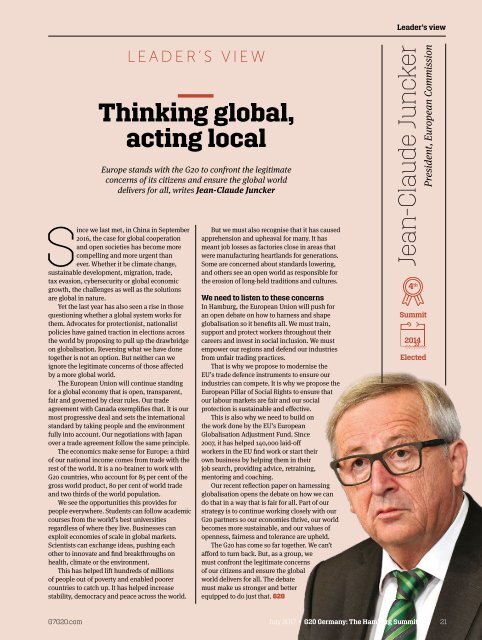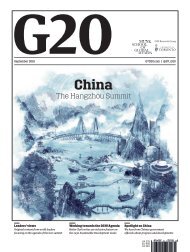G20-Germany-Hamburg-2017
mo.rami@trmg.co.uk
mo.rami@trmg.co.uk
Create successful ePaper yourself
Turn your PDF publications into a flip-book with our unique Google optimized e-Paper software.
Leader’s view<br />
Since we last met, in China in September<br />
2016, the case for global cooperation<br />
and open societies has become more<br />
compelling and more urgent than<br />
ever. Whether it be climate change,<br />
sustainable development, migration, trade,<br />
tax evasion, cybersecurity or global economic<br />
growth, the challenges as well as the solutions<br />
are global in nature.<br />
Yet the last year has also seen a rise in those<br />
questioning whether a global system works for<br />
them. Advocates for protectionist, nationalist<br />
policies have gained traction in elections across<br />
the world by proposing to pull up the drawbridge<br />
on globalisation. Reversing what we have done<br />
together is not an option. But neither can we<br />
ignore the legitimate concerns of those affected<br />
by a more global world.<br />
The European Union will continue standing<br />
for a global economy that is open, transparent,<br />
fair and governed by clear rules. Our trade<br />
agreement with Canada exemplifies that. It is our<br />
most progressive deal and sets the international<br />
standard by taking people and the environment<br />
fully into account. Our negotiations with Japan<br />
over a trade agreement follow the same principle.<br />
The economics make sense for Europe: a third<br />
of our national income comes from trade with the<br />
rest of the world. It is a no-brainer to work with<br />
<strong>G20</strong> countries, who account for 85 per cent of the<br />
gross world product, 80 per cent of world trade<br />
and two thirds of the world population.<br />
We see the opportunities this provides for<br />
people everywhere. Students can follow academic<br />
courses from the world’s best universities<br />
regardless of where they live. Businesses can<br />
exploit economies of scale in global markets.<br />
Scientists can exchange ideas, pushing each<br />
other to innovate and find breakthroughs on<br />
health, climate or the environment.<br />
This has helped lift hundreds of millions<br />
of people out of poverty and enabled poorer<br />
countries to catch up. It has helped increase<br />
stability, democracy and peace across the world.<br />
LEADER’S VIEW<br />
Thinking global,<br />
acting local<br />
Europe stands with the <strong>G20</strong> to confront the legitimate<br />
concerns of its citizens and ensure the global world<br />
delivers for all, writes Jean-Claude Juncker<br />
But we must also recognise that it has caused<br />
apprehension and upheaval for many. It has<br />
meant job losses as factories close in areas that<br />
were manufacturing heartlands for generations.<br />
Some are concerned about standards lowering,<br />
and others see an open world as responsible for<br />
the erosion of long-held traditions and cultures.<br />
We need to listen to these concerns<br />
In <strong>Hamburg</strong>, the European Union will push for<br />
an open debate on how to harness and shape<br />
globalisation so it benefits all. We must train,<br />
support and protect workers throughout their<br />
careers and invest in social inclusion. We must<br />
empower our regions and defend our industries<br />
from unfair trading practices.<br />
That is why we propose to modernise the<br />
EU’s trade defence instruments to ensure our<br />
industries can compete. It is why we propose the<br />
European Pillar of Social Rights to ensure that<br />
our labour markets are fair and our social<br />
protection is sustainable and effective.<br />
This is also why we need to build on<br />
the work done by the EU’s European<br />
Globalisation Adjustment Fund. Since<br />
2007, it has helped 140,000 laid-off<br />
workers in the EU find work or start their<br />
own business by helping them in their<br />
job search, providing advice, retraining,<br />
mentoring and coaching.<br />
Our recent reflection paper on harnessing<br />
globalisation opens the debate on how we can<br />
do that in a way that is fair for all. Part of our<br />
strategy is to continue working closely with our<br />
<strong>G20</strong> partners so our economies thrive, our world<br />
becomes more sustainable, and our values of<br />
openness, fairness and tolerance are upheld.<br />
The <strong>G20</strong> has come so far together. We can’t<br />
afford to turn back. But, as a group, we<br />
must confront the legitimate concerns<br />
of our citizens and ensure the global<br />
world delivers for all. The debate<br />
must make us stronger and better<br />
equipped to do just that. <strong>G20</strong><br />
Jean-Claude Juncker<br />
President, European Commission<br />
4 th<br />
Summit<br />
2014<br />
Elected<br />
G7<strong>G20</strong>.com July <strong>2017</strong> • <strong>G20</strong> <strong>Germany</strong>: The <strong>Hamburg</strong> Summit 21
















